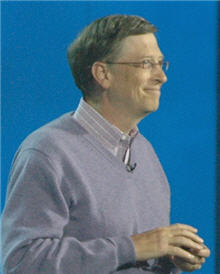Gates gives CES keynote swan song--no fireworks


He has been gradually moving into the background over the last few years, ceding his chief software architect role Ray Ozzie in June 2006. This 10th CES keynote will be his last, he said opening his keynote.
"The transition has been going well with Ray Ozzie and Craig Mundie," he added, as if he would characterize it any other way.
Gates will remain Chairman and focus on global health and education issues via the Bill & Melinda Gates Foundation. "This will be the first time since I was 17 I won't have full time job, running Microsoft," he said, and showed a very funny video of himself figuring out what to do in retirement, with guest stars Brian Williams, Jay Z, Matthew McConaghy, Bono, Steven Spielberg, George Clooney, Jon Stewart, Hillary Clinton, Barak Obama, Al Gore and assorted Microsoft executives.
In his CES keynote, Gates outlined some of the progress the company in making in its consumer electronics businesses. He said that ten years ago he was talking about the automobile PC, handheld PCs, and Internet TV, which have all evolved greatly. "The first digital decade has been a success," he declared, noting that it is just the beginning and that software in the second digital decade would be more user-centric, using rich client and Internet services. Microsoft's view is that the software future is dual-headed, the client and cloud as complementary.
Gates outlined three major themes for the second digital decade--high definition displays with 3D experiences and high quality video and audio, connected services and the power of natural interfaces.
Gates had a vision early of those themes, but his quest to make the Tablet PC, Media Center PCs and natural interfaces, such as speech and touch, more mainstream has not been realized. In 1999, Gates said:
I also think speech recognition, although we've been talking about it for decades, is finally going to get to the point where it really is quite usable. That could be anywhere from, say, two to six years away, and the extra power, the software that understands the grammar, will help get us over the threshold where this is commonplace.
I've also talked about this tablet PC, and that's the thing I see coming soonest, because handwriting recognition software has improved so dramatically, this I see only a couple of years away, drawing on the great advances in portables that we saw over the last year.
We'll also see the smaller form factors in a variety of places. The device that is just an electronic book, so it's like that tablet PC, but instead of being able to create documents and edit and annotate them, it will be less expensive because all you can do is read.
Gates noted progress in his quests in the last year, including Vista topping 100 million users, mostly gained through people buying new systems. Windows Mobile phone sales will grow to 20 million this year, he said.
Gates mentioned Silverlight, Microsoft's competitor to Adobe's Flash and AIR, and announced that Microsoft (MSN) and NBC will team up on Web coverage, hosting more than 3,600 hours of live and on-demand events and allow users to customize the experience in the Silverlight environment. "It will let us illustrate why TV will be different," Gates said. Microsoft and NBC will share revenue on the ad supported site.
Robbie Bach, president of Microsoft's Entertainment and Devices division, came on stage and talked up the latest news in his group. He said Microsoft has shipped 17.7 million Xbox consoles, with more annual revenue than Nintendo and Sony for its console. xBox Live has passed 10 million members, six months faster than expected, Bach said. He announced that ABC and Disney will bring their TV shows to the xBox Live this month, and MGM is bringing its film library to the platform. British Telecom will allow users to turn an xBox into a set-top box.
For the Windows Media Center, Samsung and HP will create adaptors that lets their flat-screen TVs act as Media Center extenders.
Microsoft's Tellme division, which provides voice-enabled search for mobile devices, will integrated with GPS to offer new services, such as buying movie tickets through the Tellme phone interface.
The new versions of Zune are doing very, very well, Bach said, and it's becoming an alternative to the iPod and differentiated by Zune Social, which allows users to discover music. Microsoft will offer the Zune in Canada by the spring, Bach said, extending outside the U.S. for the first time.
Gates showed new software from Microsoft Research that does visual recognition of faces and other objects. Pointing at a movie theater could show users what is playing, or zeroing in on a restaurant could trigger more data, such as a menus and setting up a reservation.
For a finale Bach and Gates rocked on GuitarHero with Slash.